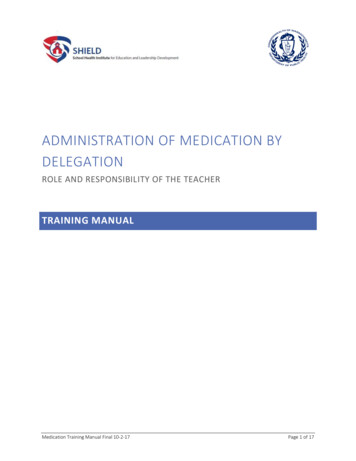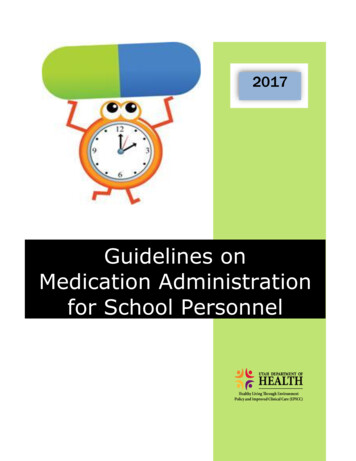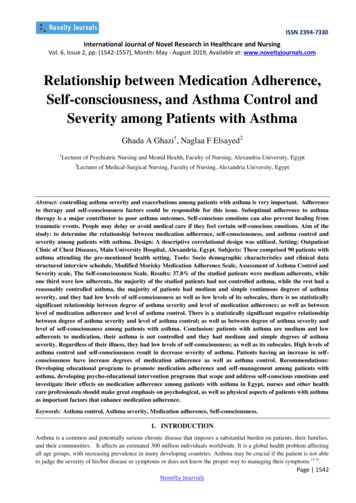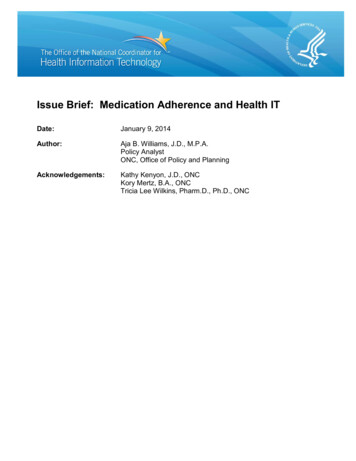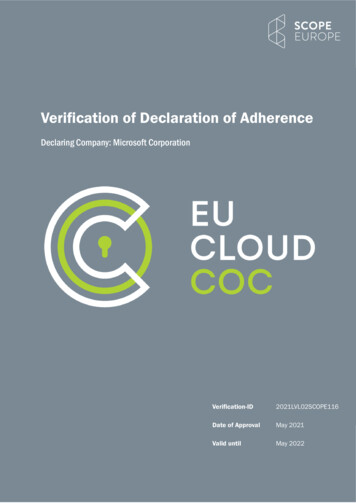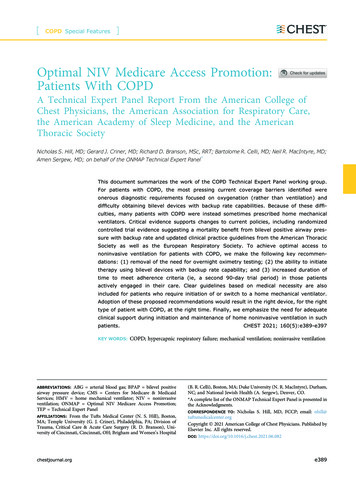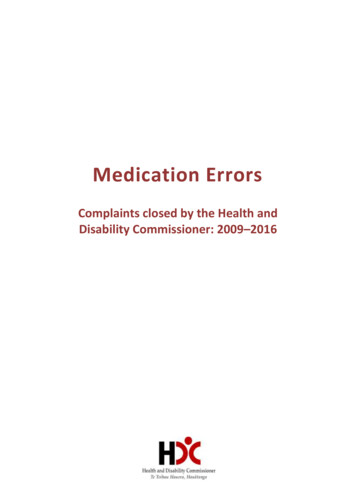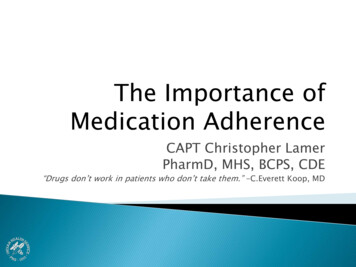
Transcription
The Importance ofMedication AdherenceCAPT Christopher LamerPharmD, MHS, BCPS, CDE“Drugs don’t work in patients who don’t take them.” -C.Everett Koop, MD
Typical Quality Measure Treatment. Adherence. Outcomes.Importance of Medication Adherence2
Definitions Adherence: the extent to which a person’s behaviortaking medication, following a diet, and/or executinglifestyle changes corresponds with agreedrecommendations from a health care provider. Medication Adherence: is a collaborative process ofcommunication and understanding between thepatient and their health care professionals thatpromotes optimal usage of medication 𝑁𝑁 𝑜𝑜𝑜𝑜 𝑝𝑝𝑝𝑝𝑝𝑝𝑝𝑝𝑝𝑝 𝑎𝑎𝑎𝑎𝑎𝑎𝑎𝑎𝑎𝑎𝑎𝑎 𝑜𝑜𝑜𝑜𝑜𝑜𝑜𝑜 𝑎𝑎 𝑝𝑝𝑝𝑝𝑝𝑝𝑝𝑝𝑝𝑝𝑝𝑝 𝑜𝑜𝑜𝑜 𝑡𝑡𝑡𝑡𝑡𝑡𝑡𝑡 100% � 𝑜𝑜𝑜𝑜 𝑝𝑝𝑝𝑝𝑝𝑝𝑝𝑝𝑝𝑝 ��𝑑𝑑𝑑𝑑𝑑 𝑜𝑜𝑜𝑜𝑜𝑜𝑜𝑜 𝑎𝑎 𝑝𝑝𝑝𝑝𝑝𝑝𝑝𝑝𝑝𝑝𝑝𝑝 𝑜𝑜𝑜𝑜 𝑡𝑡𝑡𝑡𝑡𝑡𝑡𝑡World Health Organization, 2003; Mayo Clinic, 2011; Osterberg L, Blaschke T, 2005;Winkler A, et al., 2002Importance of Medication Adherence3
Non-Adherence For every 100 medications prescribed in aclinic or office: 88% of the prescriptions are dispensed. 76% are started. 47% are continued. Return to Stock: Overall 4.4%. Per-site average is 4% to 8%.Importance of Medication Adherence4
Non-Adherence (cont.)Persistence withsecondary preventionmedication in the 24months after ischemicstroke in Sweden.Persistent use ofsecondary preventivedrugs declines rapidlyduring the first twoyears after stroke.Glader, 2010;World Health Organization, 2003;Lee, Grace, and Taylor, 2006;Spertus JA, et al. 2006;Airoldi F, et al., 2007Importance of Medication Adherence5
Medication Adherence 50% of patients are persistent with chronicmedication therapy. Poor medication adherence leads to: Increased morbidity and death. Increased health costs 300 billion per year. One-third to two-thirds of all medication-relatedhospitalizations.Osterberg L, Blaschke T, 2005;Steanacci RG, Guerin S, 2013.Importance of Medication Adherence6
Measures of Adherence Clinical Reporting System (CRS): Pharmacy Quality Alliance (PQA) report: Proportion of Days Covered (PDC). Gaps in Therapy.Importance of Medication Adherence7
PDC: Diabetes MedicationsImportance of Medication Adherence8
PDC: HTN MedicationsImportance of Medication Adherence9
PDC: Statin MedicationsImportance of Medication Adherence10
PDC: AntiretroviralsImportance of Medication Adherence11
Impact Increasing the effectiveness of adherenceinterventions may have a far greater impacton the health of the population than anyimprovement in specific medical treatments.World Health Organization, 2003;Lee JK et al, 2006.Importance of Medication Adherence12
Barriers Barriers are individualized to the patient. Five Dimensions of Adherence: Social and Economic.Healthcare System.Condition.Therapy.Patient. Adherence decreases as the number ofbarriers for the patient and providerincreases.Osterberg L, Blaschke T, 2005Importance of Medication Adherence13
Shared Responsibility Patients are responsible for taking theirmedications; however: Medication adherence is not exclusively theresponsibility of the patient. Medication-taking behavior is complex and involvespatients, the health care team, family support, andprocess components. Medication adherence improvements areachieved more often than other aspects ofself-management.Vijan et al, 2005; Rothman et al, 2008)Importance of Medication Adherence14
SIMPLE S Simplify the regimen. I Impart knowledge. M Modify patient beliefs and humanbehavior. P Provide communication and trust. L Leave the bias. E Evaluate adherence.Importance of Medication Adherence15
Simplify the Regimen Limit polypharmacy. Align with patient’s lifestyle. Coordinate medication lists.Importance of Medication Adherence16
Medication ListsImportance of Medication Adherence17
Personal Health RecordImportance of Medication Adherence18
Medication Refills over TimeImportance of Medication Adherence19
Automated Medication RefillsImportance of Medication Adherence20
Medication SynchronizationImportance of Medication Adherence21
Impart Knowledge Training. Patient Education.Importance of Medication Adherence22
Document Patient EducationImportance of Medication Adherence23
Modify Beliefs and BehaviorImportance of Medication Adherence24
Provide CommunicationImportance of Medication Adherence25
RPMS DIRECT Message Agent.Importance of Medication Adherence26
Evaluate Adherence Subjective. Objective. Biochemical.Osterberg L, 2005.Importance of Medication Adherence27
ePrescribing 73% of physicians utilize ePrescribing in EHRsystems.Importance of Medication Adherence28
Conclusion Medication adherence is an important facet ofpatient care. Medication adherence is a problem in the IndianHealth System. There are many barriers that lead to poormedication adherence. Improving adherence is anindividualized process of collaboration,understanding, and support. Many techniques can be used to assess andaddress medication adherence including heatheducation, health literacy, healthcommunications, patient engagement, and aboveall - keeping it SIMPLE.Importance of Medication Adherence29
References Sabaté E,ed. (2003). Adherence to Long-Term Therapies: Evidence for Action. Geneva, Switzerland: World HealthOrganization.Osterberg L, Blaschke T. (2005). Adherence to medication. N Engl J Med.353, 487-497.Brown MT and Bussell JK. (2011). Medication Adherence: WHO Cares? Mayo Clin Proc. 86, 304-314Winkler A, Teuscher AU, Mueller B, Diem P. (2002). Monitoring adherence to prescribed medication in type 2diabetic patients treated with sulfonylureas. Swiss Med Wkly. 132, 379-385.Steffanacci RG, Guerin S. (2013). Why Medication Adherence Matters to Patients, Payers, Providers. ManagedCare retrieved from dherence.htmlCenters for Medicare and Medicaid Services (2012). enhancements to the Part C and Part D Star Ratings retrievedfrom rPartCandDStarRatings.pdfGlader EL, Sjölander M, Eriksson M, Lundberg M. (2010). Persistent use of secondary preventive drugs declinesrapidly during the first 2 years after stroke. Stroke. 41, 397-401.Lee JK,Grace KA,Taylor AJ.(2006). Effect of a pharmacy care program on medication adherence and persistence,blood pressure, and low-density lipoprotein cholesterol: a randomized controlled trial. JAMA. 296, 2563-2571.Spertus JA, Kettelkamp R, Vance C, et al. (2006). Prevalence, predictors, and outcomes of prematurediscontinuation of thienopyridine therapy after drug- eluting stent placement: results from the PREMIER registry.Circulation. 113, 2803-2809.Airoldi F, Colombo A, Morici N, et al. (2007). Incidence and predictors of drug- eluting stent thrombosis duringand after discontinuation of thienopyridine treatment. Circulation. 116,745-754.National Community Pharmacists Association (2014). retrieved from raphic-Online2.pngMann DM, Ponieman D, Leventhal H, Halm EA. (2009) Predictors of adherence to diabetes medications: the roleof disease and medication beliefs. J Behav Med. 32:278–284Reach G. (2010). Is there an impatience genotype leading to non-adherence to long-term therapies?Diabetologia. 53, 1562-1567.Importance of Medication Adherence30
Adherence to medication. N Engl J Med.353, 487-497. Brown MT and Bussell JK. (2011). Medication Adherence: WHO Cares? Mayo Clin Proc. 86, 304-314 Winkler A, Teuscher AU, Mueller B, Diem P. (2002). Monitoring adherence to prescribed medication in type 2 diabetic patients treated with sulfonylureas. Swiss Med Wkly. 132, 379 -385.


